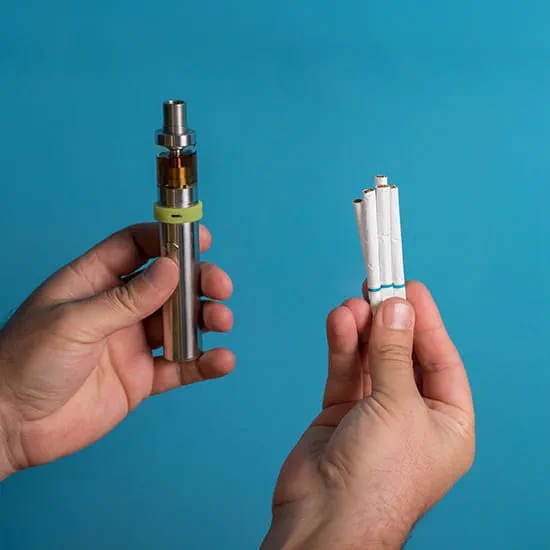
Podcast
0.25 CME Credit
Can Vaping Help with Smoking Cessation? Understanding the Risks of Dual Use - Frankly Speaking Ep 433Guest: Susan Feeney, DNP, FNP-BC, NP-C
Music Credit: Matthew Bugos
E-cigarette use has risen significantly, especially among adolescents and young adults. Many people begin vaping alongside conventional cigarettes in an effort to quit or reduce smoking. But risks are emerging, challenging the belief that vaping is safer than combustible cigarettes. Join us as we explore the latest evidence on vaping, dual use, and the associated health risks.
Episode references and resource links:
- Hamoud J, Hanewinkel R, Andreas S, et al. A Systematic Review Investigating the Impact of Dual Use of E-Cigarettes and Conventional Cigarettes on Smoking Cessation. ERJ Open Res 2024; in press (https://doi.org/10.1183/23120541.00902-2024).
- Lindson N, Butler AR, McRobbie H, et al. Electronic cigarettes for smoking cessation. Cochrane Database Syst Rev. 2024;1(1):CD010216. Published 2024 Jan 8. doi:10.1002/14651858.CD010216.pub8
- Pisinger C, Rasmussen SKB. The Health Effects of Real-World Dual Use of Electronic and Conventional Cigarettes versus the Health Effects of Exclusive Smoking of Conventional Cigarettes: A Systematic Review. Int J Environ Res Public Health. 2022;19(20):13687. Published 2022 Oct 21. doi:10.3390/ijerph192013687
- Nabbout, M. RSNA Press Release: Vaping Causes Immediate Effects on Vascular Function.
- NIH-funded studies show damaging effects of vaping, smoking on blood vessels.
https://www.nih.gov/news-events/news-releases/nih-funded-studies-show-damaging-effects-vaping-smoking-blood-vessels
- Kramarow, EA & Elgaddal, MS. Current Electorinc Cigarette Use Amoing Adults Aged 19 and Over: US, 2021. NCHS Data Brief, #475, Juky 2023.
- CDC/NCHS Data: https://www.cdc.gov/nchs/fastats/smoking.htm
Already listened on another platform?
CME/CE Information
0.25 AMA PRA Category 1 Credits™
Release Date: 5/19/2025
Expiration Date: 5/19/2027
Learning Objectives
- Define dual use
- Discuss the impact of dual use on decreasing the use of conventional cigarettes
- Explain the known and potential risks of dual use
Faculty

Frank J. Domino, MD
Professor, Family Medicine and Community Health,
University of Massachusetts Medical School, Worcester, MA

Susan Feeney, DNP, FNP, FAANP
Assistant Professor, Family Nurse Practitioner Program Coordinator, Graduate School of Nursing, University of Massachusetts Chan Medical School, Worcester, MA
Learn MoreDisclosures
Frank J. Domino, MD: Has disclosed no relevant financial relationships.
Susan Feeney, DNP, FNP-BC, NP-C: Has disclosed no relevant financial relationships.
Non-faculty contributors involved in the planning, development, editing, and review of the content have disclosed no relevant financial relationships.
CME/CE Information
AMA PRA Category 1 Credits™
Accreditation Statement
Pri-Med Institute is accredited by the Accreditation Council for Continuing Medical Education (ACCME) to provide continuing medical education for physicians.
Designation Statement
Pri-Med Institute designates this enduring material for a maximum of 0.25 AMA PRA Category 1 Credit™. Physicians should claim only the credit commensurate with the extent of their participation in the activity.
Instructions for Obtaining Credit
For APRNs and PAs, AANPCB and NCCPA accept AMA PRA Category 1 Credit™ as the number of hours of participation (AANPCB) or as Category 1 CME credits (NCCPA).
Fine Print
The preferred browser is Google Chrome. If using a different browser, such as Safari, Firefox or Edge, make sure you are using the most up-to-date version. Your Internet settings should be set to accept cookies and JavaScript. If cookies and/or JavaScript are disabled, the site may not function properly. A high-speed Internet connection is not required; however, it is recommended for faster download times.
The opinions, ideas, and recommendations expressed in this educational activity are those of the faculty only and are not necessarily endorsed by, nor do they necessarily reflect, those of their affiliated institutions, Pri-Med Institute, Pri-Med Institute Advisory Boards and Consultants, DBC Pri-Med, LLC.
Clinical judgment must guide each clinician in weighing the possible risks, benefits, or contraindications of any diagnostics, interventions or treatments discussed. Clinicians should review manufacturers’ product information and consider these with the recommendations of other authorities when applying the assessment and/or clinical management strategies discussed in this activity to the care of their patients.
Pri-Med Institute educational activities are developed and conducted in accordance with the ACCME's Standards for Integrity and Independence in Accredited Continuing Education. It is the mission of Pri-Med Institute to develop and present educational activities that are timely, fair-balanced, scientifically rigorous, and that serve to improve patient outcomes. To that end, we welcome your comments about how to better serve your needs.
Pri-Med Institute Accredited Provider
Pri-Med programs are owned and operated by DBC Pri-Med, LLC, a division of Diversified Communications, Inc. Pri-Med Institute, the accredited division of Pri-Med, is accredited with commendation by the ACCME and approved as a provider of continuing education by the AANP.
Disclosures and Conflict of Interest
Pri-Med Institute requires all individuals in a position to influence educational content for Pri-Med Institute-certified CME/CE activities to disclose personal financial relationships with commercial interests or ineligible companies prior to contributing to its educational activities. Pri-Med Institute assesses disclosed relationships and follows a defined process to mitigate real or implied conflicts to ensure, to the best of its ability, that all educational content is free of commercial bias. All relevant financial relationships have been mitigated Financial disclosures for everyone in control of educational content are provided before the start of each CME/CE activity.
Discussion of Off-Label Uses and Investigational Products
During the course of their presentations, the faculty may mention uses of products that have not been approved in the United States for the indication(s) being discussed. All presenters are instructed to notify participants when they are discussing unapproved uses or investigational agents. In addition, specific slides will include notation of the off-label use or investigational agent being discussed. Views presented related to unapproved uses of products are solely those of the presenter(s) and are not endorsed by Pri-Med Institute or DBC Pri-Med, LLC.
Questions?
If you have questions about this activity, please email support@pri-med.com or call (877) 477-4633.